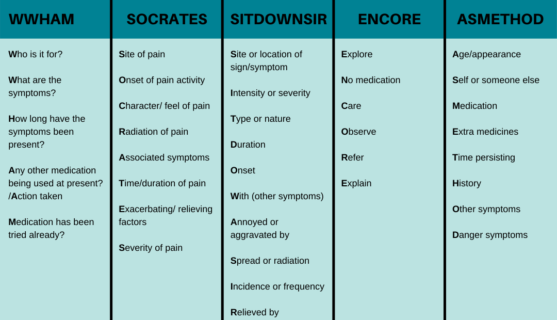Below are some mnemonics to ensure all the necessary information is collected.
WWHAM is the foundation of our consultation skills and will often be the first mnemonic you learn and use for the rest of your career. Each mnemonic is useful in different situations and increases our clinical knowledge.

Always start by introducing yourself with your name and role. It is important to put a name to your face for familiarity. After asking for the patient’s name, age or date of birth, and address, ask the patient what their presenting complaint is, then ask for the patient’s consent to continue.
For privacy and patient confidentiality, in a community pharmacy setting, ask the patient if they would like to go into the consultation room. In a hospital setting, you would close the dividing curtains. Ask the patient if they would like a chaperone with them during the consultation.
Asking a patient if they would like a chaperone is important to remember during your OSCEs. When you’re at work, you can also ask for a chaperone or colleague if you feel uncomfortable being alone with a patient. A chaperone protects a patient and a pharmacist.
Talk in plain English where possible so that the patient understands what you are saying. Patients are not necessarily used to having consultations and may not understand healthcare terminology. During a consultation allow the patient to speak and show them that you are actively listening during the session. Be empathetic and reassuring to your patient to ensure they are comfortable with you.
Active listening:
Active listening is an integral way of building trust and conveying respect for a patient. Remember, active listening online, via phone, or whilst wearing a mask might be different and you’ll need to take this into account.
- Engage with the patient non-verbally by nodding or using facial expressions. Maintain eye contact to show you’re focused on them
- Engage with the patient with occasional verbal responses to show you’re listening. It’s important to never interrupt a patient
- Try reusing a patient’s words exactly to show you’ve been paying attention. This is called reflective listening.

By Sarah-Ann Famakinwa, third-year MPharm student, Wolverhampton University